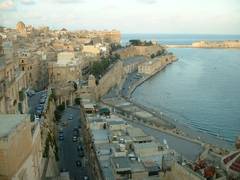A workshop - jointly organised by the UNESCO Regional Bureau for Science and Culture in Europe, Venice (Italy), the Section on Earth Sciences and Geo-Hazards Risk Reduction, Natural Sciences Sector of UNESCO, and the Maltese National Commission for UNESCO - will bring together heritage professionals, site managers and emergency responders from South-East European and Mediterranean countries on 14-19 November 2015 in the City of Valletta, inscribed on the World Heritage List in 1980.
Participants from Albania, Cyprus, Greece, Malta and Turkey will gather in the Campus of the University of Malta and will be introduced to disaster risk reduction principles to be incorporated in management plans for World Heritage sites and other cultural heritage sites.
In 2007, the World Heritage Committee adopted a ‘Strategy for Reducing Risks from Disasters at World Heritage Properties’ which encourages all State Parties to develop disaster risk management plans for the World Heritage properties in their respective countries. The new internationally endorsed ‘Sendai Framework for Disaster Risk Reduction 2015-2030’ also clearly highlights the importance of reducing disaster risk in cultural heritage sites.
With this in mind, the workshop in Malta will adopt a participatory methodology and a special focus will be placed on risk preparedness for geohazards, specifically landslides, earthquakes, wild fires and floods, as well as structural fires, with the participation of an interdisciplinary team of highly qualified international experts and trainees from World Heritage sites’ management and emergency responders. The aim will be to raise awareness amongst professionals and responsible agencies of the need to develop appropriate and tailored disaster management plans and to build capacities in the development of appropriate risk management mechanisms in cultural sites of the South-East European and Mediterranean areas.
Heritage professionals from Malta and countries of the South-East European and Mediterranean area will be provided with knowledge on current thinking, methods and tools available to identify, assess and manage multiple natural-derived hazards and risks and learn about preparatory measures to mitigate their material and human impact. The workshop will close with a final presentation developed during the workshop by the trainees at the Italian Cultural Institute in Valletta.

Queryzo - City of Valletta from the Upper Barrakka Gardens
